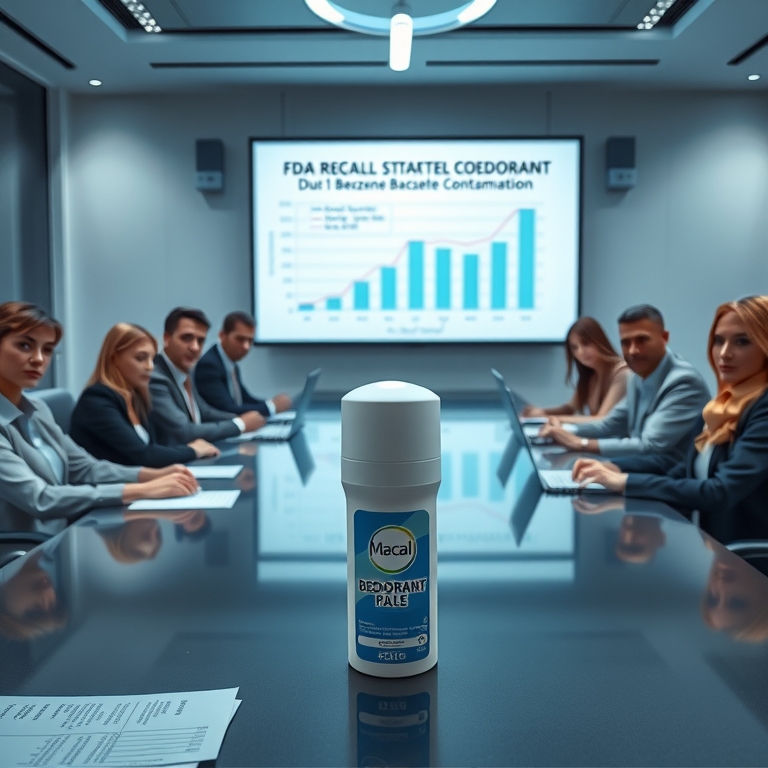In a significant move that has sent ripples through the consumer goods industry, the U.S. Food and Drug Administration (FDA) has announced a recall of a popular deodorant brand due to the presence of benzene, a known carcinogen. This development marks a critical moment in the intersection of consumer safety and corporate responsibility, raising questions about product safety standards and the diligence of companies in safeguarding public health.
The deodorant in question, widely recognized for its fresh scent and long-lasting protection, has been a staple in the personal care routines of millions of Americans. Its recall underscores the delicate balance between product efficacy and safety, a balance that is the cornerstone of consumer trust. The presence of benzene, a chemical compound linked to an increased risk of leukemia and other blood disorders, has stirred both concern and confusion among consumers and industry professionals alike.
The FDA’s decision to recall the product was not made lightly. The regulatory body, tasked with ensuring the safety and efficacy of a wide range of consumer products, conducted a thorough investigation following reports of contamination. This investigation was bolstered by independent lab tests commissioned by a consumer advocacy group, which first detected the benzene contamination. The findings prompted swift action from the FDA, emphasizing its commitment to public health and the rigorous enforcement of safety regulations.
The recall has sparked a flurry of activity within the affected company, which has pledged full cooperation with the FDA. In a statement, the company expressed its commitment to consumer safety and its intention to conduct a comprehensive review of its manufacturing processes. The company has also set up a dedicated hotline and website to assist customers in returning the affected products and receiving refunds. This proactive approach is a testament to the company’s dedication to transparency and responsibility in a challenging situation.
The ramifications of this recall extend beyond the immediate concerns of consumer safety. For the company, the recall represents a significant reputational challenge. In an era where brand loyalty is often built on trust and authenticity, any breach of safety can have long-lasting impacts on consumer perception. Moreover, the recall could lead to financial repercussions, not only from the direct costs associated with the recall process but also from potential legal actions and decreased sales.
For the broader industry, the recall serves as a stark reminder of the importance of rigorous quality control measures. It stresses the necessity for companies to continually assess and update their safety protocols to prevent such incidents. This event may prompt industry-wide introspection and potentially lead to more stringent safety standards and testing requirements, as companies strive to reassure consumers of their commitment to safety.
The recall also highlights the critical role of regulatory bodies like the FDA in protecting consumer interests. The prompt response by the FDA reinforces the importance of robust regulatory frameworks that can adapt to emerging risks and challenges. It also underscores the need for collaboration between regulatory agencies, companies, and independent organizations to ensure that consumer safety is not compromised.
As consumers process this news, many may find themselves re-evaluating their choices and seeking alternatives that offer both safety and reliability. This shift in consumer behavior could open opportunities for competitors to gain market share by emphasizing their commitment to safety and transparency. Additionally, it may encourage innovation within the industry as companies explore new formulations and technologies to enhance product safety without compromising on performance.
The recall of a popular deodorant brand due to benzene contamination risks is a sobering reminder of the complexities involved in balancing product performance with consumer safety. It serves as a case study in crisis management, highlighting the importance of swift and transparent communication in maintaining consumer trust. For the affected company and the industry at large, this incident is an opportunity to reinforce their commitment to safety, improve quality control processes, and rebuild consumer confidence.
In conclusion, while the recall presents immediate challenges, it also offers valuable lessons for all stakeholders involved. By prioritizing safety and transparency, companies can navigate such crises more effectively and emerge with their reputations intact. As the industry moves forward, the focus must remain on ensuring that consumer safety is never compromised, reinforcing the trust that is the foundation of all successful consumer relationships.

Leave a Reply